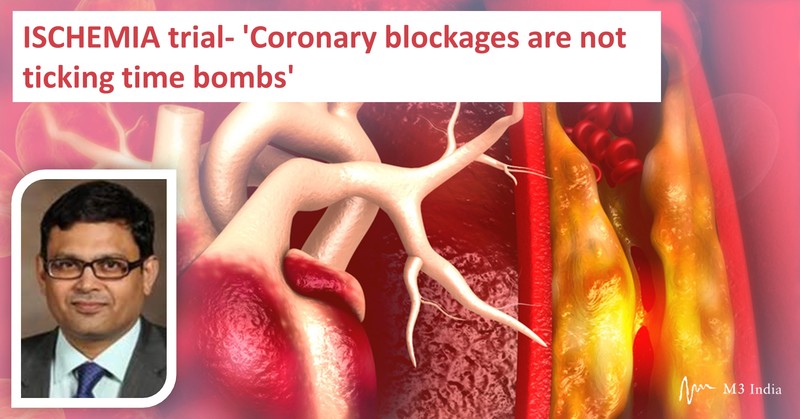ISCHEMIA trial- 'Coronary blockages are not ticking time bombs' says Dr. Sundeep Mishra
M3 India Newsdesk Feb 18, 2020
Dr. Sundeep Mishra opines on the results of the ISCHEMIA trial that challenged the current practice of percutaneous coronary intervention (PCI) or coronary artery bypass surgery (CABG) along with optimal medical therapy (OMT) for coronary artery disease patients.

Currently revascularisation; percutaneous coronary intervention (PCI) or coronary artery bypass surgery (CABG) along with optimal medical therapy (OMT) is the gold standard for treatment in acute coronary syndromes (ACS) including acute myocardial infarction (AMI). However, use of PCI/CABG in patients with chronic stable angina (CSA) is more controversial. Data from USA suggests that most in-appropriate PCIs occur in this setting.
Classically, indication for revascularisation in CSA has been severe angina, uncontrolled despite optimal medical therapy, severe ischaemia on non-stress testing, large area of myocardium under jeopardy and certain anatomic subsets such as left main disease, ostial left anterior descending or low ejection fraction. Over the course of decades, data has been emerging that even among these subsets more and more patients can be managed conservatively without PCI/CABG with only medical therapy.
ISCHEMIA trial
The National Heart, Lung, and Blood Institute (NHLBI)-sponsored trial compared an initial invasive strategy with PCI/CABG plus OMT against a conservative treatment strategy of OMT alone in stable patients with moderate-to-severe ischaemia on stress testing. The trial had a randomised, parallel design enrolling 2,588 subjects to routine invasive therapy versus 2,591 subjects to medical therapy.
It included patients >20 years of age and moderate to severe ischaemia on non-invasive stress testing (defined as nuclear ≥10% ischaemia; echo ≥3 segments of ischaemia; cardiac magnetic resonance ≥12% ischaemia and/or ≥3 segments with ischaemia; exercise treadmill test ≥1.5 mm ST depression in ≥2 leads or ≥2 mm ST depression in single lead at <7 METs with angina). However, the trial excluded patients with ACS, uncontrolled angina, heart failure, chronic kidney disease, certain anatomic subsets like left main>stenosis >50%, low ejection fraction <35% or those who had undergone PCI/CABG in past.
The main finding was that primary outcome of cardiovascular death, myocardial infarction, resuscitated cardiac arrest, or hospitalisation for unstable angina or heart failure at 3.3 years occurred in 13.3% of the routine invasive group versus 15.5% of the medical therapy group (p = 0.34). The findings were the same in multiple subgroups. More importantly, there was no heterogeneity of treatment effect based on coronary artery disease (CAD) severity, baseline ischaemia level, or even the presence of left anterior descending disease.
Overall, invasive therapy was associated with harm (~2% absolute increase) within the first 6 months and benefit within 4 years (~2% absolute decrease).
Dr. Mishra writes...
This ISCHEMIA study changes cardiology practice because it informs us that most patients with CAD don’t require PCI/CABG for treatment. Rather, these modalities should be reserved for those individuals who do not benefit from/remain resistant to optimal medical therapy.
Disclaimer- The views and opinions expressed in this article are those of the author's and do not necessarily reflect the official policy or position of M3 India.
The writer, Dr. Sundeep Mishra is a Professor of Cardiology.
-
Exclusive Write-ups & Webinars by KOLs
-
Daily Quiz by specialty
-
Paid Market Research Surveys
-
Case discussions, News & Journals' summaries